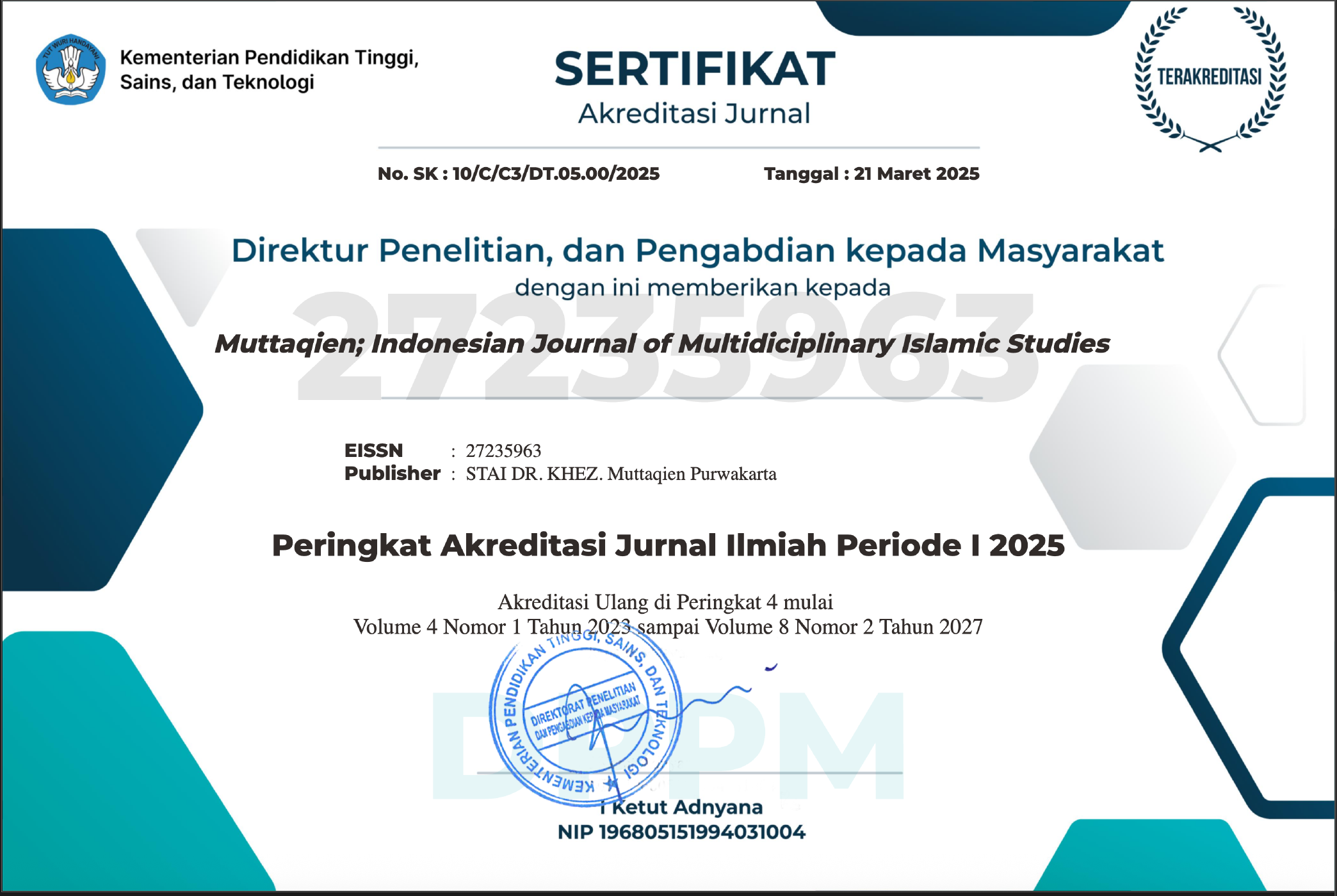Hikmah Larangan Mendekati Zina dalam Q.S Al-Isra’ Ayat 32 Perspektif Tafsir Al-Mishbah
Keywords:
hikmah, zina, tafsir al-mishbahAbstract
What we see before our eyes and through the screen nowadays makes us very, very worried that the crime of free sex is very likely to happen to some of our family members. Why not, the current phenomenon of free sex and adultery in this country presents fantastic numbers. Initially, it was driven by lust, so that lust took control of oneself and adultery arose. In the past, adultery, which was still taboo to discuss, has now become a topic of discussion that is popular with people, considering it normal and a lawful act to do.
This research is library research, namely research whose main object is library research. The primary data source is a book of tafsir entitled Tafsir Al-Mishbah: Message, Impression and Harmony of the Al-Qur'an by M. Quraish Shihab. The interpretation methodology uses the tahlili (analytical) and maudhui' (thematic) interpretation methods.
The aims of this research are 1). Knowing Quraish Shihab's interpretation of Q.S Al-Isra' verse 32 in Tafsir Al-Mishbah. 2). Knowing the analysis of the interpretation of Al-Mishbah in Q.S Al-Isra' Verse 32 regarding Zina. 3). Knowing the implementation of education on the prohibition of approaching adultery in the present.
Based on research analysis, it can be concluded that 1). Quraish Shihab's interpretation of Q.S Al-Isra' verse 32 focuses only on explaining: First, explaining the prohibition on approaching adultery, namely the prohibition on approaching acts that could lead to adultery by explaining one of the initial factors or causes of adultery, second, explaining the bad effects of adultery. That. Quraish Shihab's interpretation of this verse, the focus of his interpretation is only explaining the factors and impacts, there is no explanation regarding prevention. 2). Analysis of Quraish Sihab's interpretation of Q.S Al-Isra' verse 32 Quraish Shihab uses the theory of munasabah. Quraish Sihab in Tafsir Al-Mishbah summarizes Surah Al-Isra' verse 32 with the verses before and after it, namely Q.S Al-Isra' verses 31 and 33, and also correlates it with 2 methods of scholarly opinion, namely Al-Biqa'i and Sayyid Quthub. The three verses above and the two scholars both discuss the impact of adultery, one of which is murder. 3). There are many educational implementations of the prohibition against adultery from a theoretical perspective today. Here the author explains an educational narrative about the problem of adultery, the focus of the education is: 1). Explain the factors that cause adultery. 2). Explain the bad effects of adultery. 3). Explaining tips to avoid adultery, and finally the ultimate goal of this research, the author explains the wisdom or urgency of the prohibition on approaching adultery.
References
Muhammad Amin Suma,Ulumul Qur'an , Jakarta:PT. Raja Grafindo Persada, 2014.
Atabik Ali dan Ahmad Zuhdi Muhdlor, Kamus Kontemporer Arab-Indonesia Yogyakarta: Yayasan Ali Maksum Pondok Pesantren Krapyak, 1996.
Nashruddin Baidan, Metodologi Penafsiran Al-Qur’an, Yogyakarta: Pustaka Pelajar, 2005.
M. Quraish Shihab, Kaidah Tafsir; Syarat, Ketentuan, Dan Aturan Yang Patut Anda Ketahui Dalam Memahami Ayat-Ayat Al-Qur’an , Tanggerang:Lentera Hati, 2013.
Abu Anwar Al-Fikra, Keharmonisan sistematika Al-Qur'an: kajian terhadap Munasabah Al-Qur'an, Pascasarjana Jurusan Ilmu Al-Qur’an dan Tafsir UIN Sultan Syarif Kasim Riau 2008.
Published
How to Cite
Issue
Section
Copyright (c) 2024 Saskia Irhamni, Cucu Nurhikmah, Amit Saepul Malik

This work is licensed under a Creative Commons Attribution-ShareAlike 4.0 International License.
Muttaqien; Indonesian Journal of Multidiciplinary Islamic Studies allow the author(s) to hold the copyright without restrictions and allow the author(s) to retain publishing rights without restrictions and authors who publish with this journal agree to the following terms:
In developing strategy and setting priorities, Muttaqien; Indonesian Journal of Multidiciplinary Islamic Studies recognize that free access is better than priced access, libre access is better than free access, and libre under CC-BY-SA or the equivalent is better than libre under more restrictive open licenses. We should achieve what we can when we can. We should not delay achieving free in order to achieve libre, and we should not stop with free when we can achieve libre.
Muttaqien; Indonesian Journal of Multidiciplinary Islamic Studies has a CC-BY SA license or its equivalent as the optimal license for publication, distribution, use and reuse of scientific work. This license is under a Creative Commons Attribution 4.0 International License.
You are free to:
- Share — copy and redistribute the material in any medium or format
- Adapt — remix, transform, and build upon the material for any purpose, even commercially.
- The licensor cannot revoke these freedoms as long as you follow the license terms.










